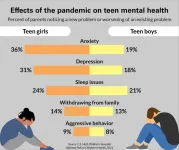(Press-News.org) DALLAS, March 15, 2021 — Primary care clinics can play an important role in preserving patients’ brain health using the American Heart Association’s Life’s Simple 7 as a guide, as well as addressing 6 other factors associated with cognitive decline, according to a new American Stroke Association/American Heart Association Scientific Statement. “A Primary Care Agenda for Brain Health,” published today in the Associations’ journal Stroke.
Preserving brain health in an aging population is a growing concern in the U.S. An estimated one in five Americans 65 years and older has mild cognitive impairment, and one in seven has dementia. By 2050, the number of Americans with dementia is expected to triple, the statement authors note.
“Primary care is the right home for practice-based efforts to prevent or postpone cognitive decline. Primary care professionals are most likely to identify and monitor risk factors early and throughout the lifespan,” said Chair of the scientific statement writing group Ronald M. Lazar, Ph.D., FAHA, the Evelyn F. McKnight Endowed Chair for Learning and Memory in Aging and director of the Evelyn F. McKnight Brain Institute at the University of Alabama at Birmingham School of Medicine. “Prevention doesn’t start in older age; it exists along the health care continuum from pediatrics to adulthood. The evidence in this statement demonstrates that early attention to these factors improves later life outcomes.”
Life’s Simple 7 focuses on seven lifestyle targets to achieve ideal cardiovascular health: managing blood pressure, healthy cholesterol levels, reducing blood sugar, increasing physical activity, eating better, losing weight and not smoking. The new statement suggests primary care professionals also consider assessing risk factors to address cognitive health. The six risk factors to consider, in addition to Life’s Simple 7, that impact optimal brain health are depression, social isolation, excessive alcohol use, sleep disorders, less education and hearing loss. The statement lists risk factors for cognitive impairment, prevention strategies and best practices to integrate brain health prevention into primary care.
“Scientists are learning more about how to prevent cognitive decline before changes to the brain have begun. We have compiled the latest research and found Life’s Simple 7 plus other factors like sleep, mental health and education are a more comprehensive lifestyle strategy that optimizes brain health in addition to cardiovascular health,” said Lazar, who is also a professor of neurology and neurobiology at the University of Alabama at Birmingham.
The statement uses cognition to define brain health, referring to the spectrum of intellectual-related activities, such as memory, thinking, reasoning, communication, and problem solving that enables people to thrive and navigate the world on an everyday basis. The ability to think, solve problems, remember, perceive and communicate are crucial to successful living; their loss can lead to helplessness and dependency.
“Studies have shown that these domains are impacted by factors that are within our control to change,” Lazar said. “Prevention and mitigation are important, because once people have impaired cognition, the current treatment options are very limited.”
According to the statement:
Recent data show that hypertension, diabetes and smoking in adulthood and middle-life increase the odds of cognitive decline in middle-age and accelerate cognitive decline in older age.
People with dementia experience lower quality of life, and caregivers - typically family members - experience high rates of psychological stress and physical ill-health. Dementia is more costly than heart disease or cancer, with worldwide costs estimated at $818 billion in 2015.
Primary care is the right place for practice-based efforts to prevent or postpone cognitive decline. This setting can provide comprehensive coordinated care to promote AHA‘s Life’s Simple 7 as a guide for brain health and overall wellness.
Professional guidelines also recommend routine screening for depression and counseling patients to focus on healthy eating and exercising a minimum of 150 minutes a week.
Implementation of practices to prevent cognitive decline often fall short – referred to as an evidence-practice gap. However, new practices and technology like telehealth, which are more common as a result of the COVID-19 pandemic, are addressing this gap.
Lack of access to primary care services may be a barrier to prevention. Even with the Affordable Care Act, an estimated 15% of Americans adults still lack health insurance, and 25% of Americans do not have a source of primary care.
“Many people think of high blood pressure, Type 2 diabetes and other risk factors as affecting only heart health, yet these very same risk factors affect our brain health. Patients might be more likely to pay attention to the importance of addressing modifiable risk factors if they understood the links,” Lazar said. “I’ve given lectures, and what people tell me is, the one thing they do not want to lose during the course of their lives is their mind.”
In 2017, the American Stroke Association/American Heart Association issued a presidential advisory on achieving optimal brain health that includes Life’s Simple 7.
The American Heart Association and the Paul G. Allen Frontiers Group together with additional contributors, including the Oskar Fischer Project and Henrietta B. and Frederick H. Bugher Foundation, have committed over $43 million to fund research with the potential to move forward brain health and cognitive impairment science. The American Heart Association/Allen Initiative in Brain Health and Cognitive Impairment has granted 3 competitive basic science research awards to study brain health over eight years.
This scientific statement was prepared by the volunteer writing group on behalf of the American Heart Association’s Stroke Council, and the American Academy of Neurology affirms the value of the statement, additionally, as an educational tool for neurologists.
INFORMATION:
Co-authors are Virginia J. Howard, Ph.D., FAHA, vice-chair; Walter N. Kernan, M.D.; Hugo J. Aparicio, M.D., M.P.H.; Deborah A. Levine, M.D., M.P.H.; Anthony J. Viera, M.D., M.P.H.; Lori C. Jordan, M.D., Ph.D.; David L. Nyenhuis, Ph.D.; Katherine L. Possin, Ph.D.; Farzaneh A. Sorond, M.D., Ph.D.; and Carole White, Ph.D., R.N. Author disclosures are in the manuscript.
Additional Resources:
After March 15, view the manuscript online.
Control stroke risk factors for better brain health
Stay physically and mentally healthy
Mental health is important to overall health
Follow AHA/ASA news on Twitter @HeartNews
The Association receives funding primarily from individuals. Foundations and corporations (including pharmaceutical, device manufacturers and other companies) also make donations and fund specific Association programs and events. The Association has strict policies to prevent these relationships from influencing the science content. Revenues from pharmaceutical and biotech companies, device manufacturers and health insurance providers are available here, and the Association’s overall financial information is available here.
About the American Heart Association
The American Heart Association is a relentless force for a world of longer, healthier lives. We are dedicated to ensuring equitable health in all communities. Through collaboration with numerous organizations, and powered by millions of volunteers, we fund innovative research, advocate for the public’s health and share lifesaving resources. The Dallas-based organization has been a leading source of health information for nearly a century. Connect with us on heart.org, Facebook, Twitter or by calling 1-800-AHA-USA1.
HOUSTON ? A high rate of genetic mutations within a tumor, known as high tumor mutation burden (TMB), was only useful for predicting clinical responses to immune checkpoint inhibitors in a subset of cancer types, according to a new study led by researchers from The University of Texas MD Anderson Cancer Center.
The findings, published today in Annals of Oncology, suggest that TMB status may not be reliably used as a universal biomarker for predicting immunotherapy response. While TMB status was capable of successfully predicting response to checkpoint blockade in certain cancers, such as melanoma, lung and bladder cancer, there was no association with improved outcomes in others, including breast, prostate and brain ...
A large study of people in 28 countries found men aged 50 and over had a 60% greater risk of death than women, partly explained by heavier rates of smoking and heart disease in men, although the gap varied across countries, according to new research in CMAJ (Canadian Medical Association Journal) .
"Many studies have examined the potential impact of social, behavioural and biological factors on sex differences in mortality, but few have been able to investigate potential variation across countries," writes Dr. Yu-Tzu Wu, Institute of Psychiatry, Psychology and Neuroscience, King's College London, and Population Health Sciences Institute, Newcastle University, United Kingdom, with coauthors. "Different cultural traditions, historical contexts, ...
ANN ARBOR, Mich. - For teens, pandemic restrictions may have meant months of virtual school, less time with friends and canceling activities like sports, band concerts and prom.
And for young people who rely heavily on social connections for emotional support, these adjustments may have taken a heavy toll on mental health, a new national poll suggests.
Forty-six percent of parents say their teen has shown signs of a new or worsening mental health condition since the start of the pandemic in March 2020, according to the C.S. Mott Children's Hospital National Poll on Children's Health at Michigan Medicine. Parents of teen girls were more likely to say their child had a ...
PULLMAN, Wash. - People who talk with their doctors are more likely to get vaccinated during a pandemic, according to a study of evidence collected during the "swine flu," the last pandemic to hit the U.S. before COVID-19.
Researchers from Washington State University and University of Wisconsin-Madison surveyed patients about the vaccine for the H1N1 virus, also known as the swine flu, which was declared a pandemic by the World Health Organization in 2009. They found that doctor-patient communication helped build trust in physicians, which led to more positive attitudes toward the H1N1 vaccine--and it was more than just talk; it correlated to people actually getting vaccinated. ...
(COLUMBUS, Ohio) - High-powered magnets are small, shiny magnets made from powerful rare earth metals. Since they started showing up in children's toys in the early 2000s and then later in desk sets in 2009, high-powered magnets have caused thousands of injuries and are considered to be among the most dangerous ingestion hazards in children.
When more than one is swallowed, these high-powered magnets attract to each other across tissue, cutting off blood supply to the bowel and causing obstructions, tissue necrosis, sepsis and even death. The U.S. Consumer Product Safety Commission (CPSC) found them dangerous enough that in 2012 they halted the sale of high-powered magnet sets and instituted a recall followed by a federal rule that ...
A fear of poor SATs results is driving headteachers to separate pupils by ability despite the impact on children's self-esteem and confidence, according to a study by researchers from UCL published in the peer-reviewed British Journal of Sociology of Education.
The findings, based on a survey of nearly 300 principals of primary schools in England, provide new evidence of a high-stakes culture around testing where some pupils are prioritised above others and physically segregated from them.
More than a third (35%) of headteachers said SATs were the reason for grouping children into different ability sets for English, and just under half (47%) for maths, according to the results which also ...
In the world of neurodevelopment, one thing is clear: the earlier the intervention the better. Infancy is a critical time in brain development, and neuroscientists are increasingly identifying factors that can negatively impact cognition and ones that can improve cognition early in life. At the annual meeting of the Cognitive Neuroscience Society (CNS), researchers from the University of Minnesota are presenting new work on two early interventions: one on the potential use of engineered gut microbes for antibiotic-exposed infants and another on a choline supplement to treat infants exposed prenatally to alcohol.
"These talks underscore how patient-based neuroscience can advance ...
Men experiencing vital exhaustion are more likely to have a heart attack, according to research presented today at ESC Acute CardioVascular Care 2021, an online scientific congress of the European Society of Cardiology (ESC).1 The risk of a myocardial infarction linked with exhaustion was particularly pronounced in never married, divorced and widowed men.
"Vital exhaustion refers to excessive fatigue, feelings of demoralisation and increased irritability," said study author Dr. Dmitriy Panov of the Institute of Cytology and Genetics, Novosibirsk, Russian Federation. "It is thought to be a response to intractable problems in people's lives, particularly when they are unable to adapt to prolonged ...
Tokyo, Japan - Scientists from Tokyo Metropolitan University have developed a new method for making ordered arrays of nanoholes in metallic oxide thin films using a range of transition metals. The team used a template to pre-pattern metallic surfaces with an ordered array of dimples before applying electrochemistry to selectively grow an oxide layer with holes. The process makes a wider selection of ordered transition metal nanohole arrays available for new catalysis, filtration, and sensing applications.
A key challenge of nanotechnology is getting control over the structure of materials at the nanoscale. In the search for materials that are porous at this length scale, the field of electrochemistry offers a particularly elegant ...
MRI scanning can more precisely define and detect head, neck, thoracic, abdominal and spinal malformations in unborn babies, finds a large multidisciplinary study led by King's College London with Evelina London Children's Hospital, Great Ormond Street Hospital and UCL.
In the study, published today in Lancet Child and Adolescent Health, the team of researchers and clinicians demonstrate the ways that MRI scanning can show malformations in great detail, including their effect on surrounding structures. Importantly, they note that MRI is a very safe procedure for pregnant women and their babies.
They say the work is invaluable both to clinicians caring for babies before they are born and for teams planning care of the baby after delivery.
Recent research has concentrated ...


